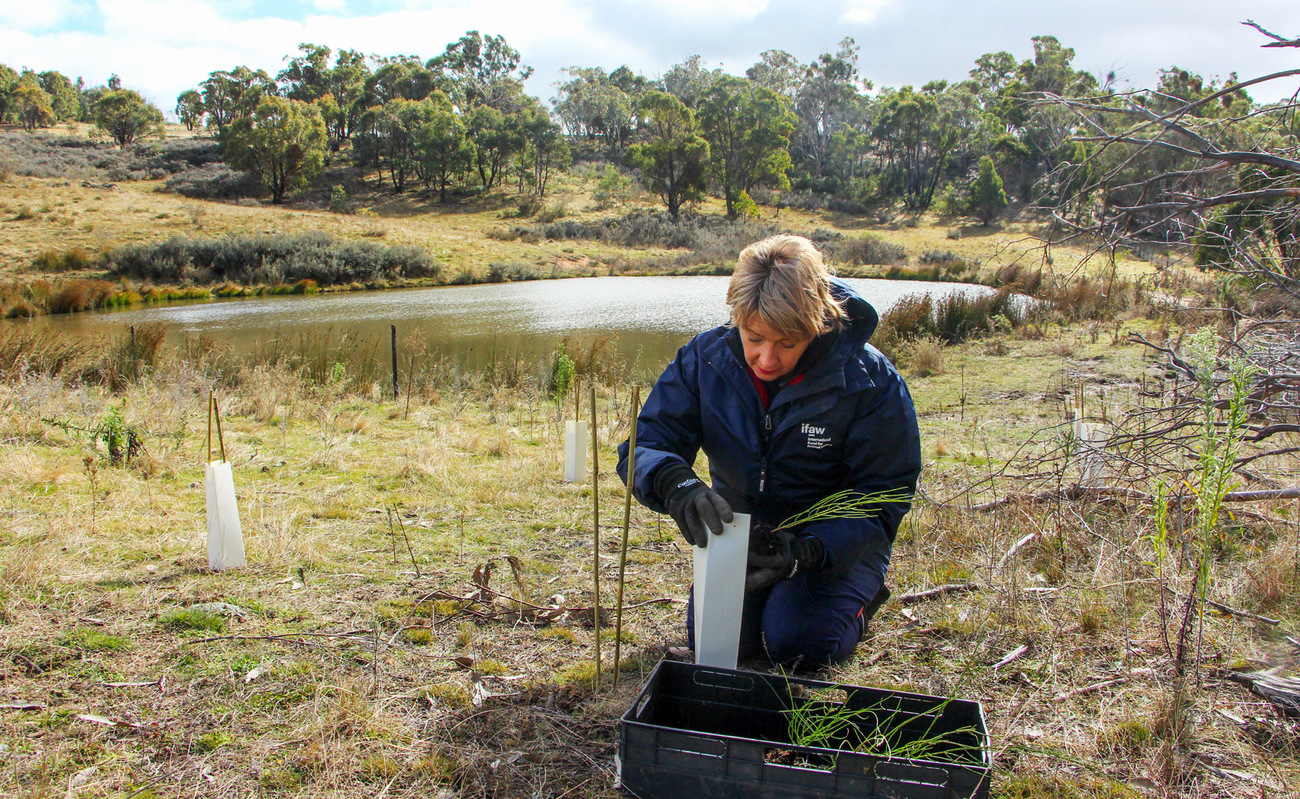Restoring Two Thumbs Wildlife Sanctuary
Restoring Two Thumbs Wildlife SanctuaryBringing Wildlife Back to Black Summer Bushfire-ravaged Sanctuary
Bringing Wildlife Back to Black Summer Bushfire-ravaged Sanctuary

Sydney, 22 May 2023 – Hundreds of animals are expected to move into revolutionary multi-species nest boxes—the animal equivalent of two-bedroom homes—at a bushfire-ravaged wildlife sanctuary in Australia.
IFAW has been working with Habitat Innovation and Management to restore Two Thumbs Wildlife Trust Sanctuary to the wildlife haven it was before the Black Summer bushfires. The intensity of the fires in 2019-20 left the landscape in southern New South Wales (NSW) struggling to bounce back and hundreds of tree hollow-dependent animals homeless.
The two groups are encouraging native wildlife to return to the 724-hectare property by installing 100 innovative Habitech nest boxes which mimic natural hollows found in trees.
In a world-first initiative, 20 nest boxes designed to house different species in two separate chambers (such as birds and microbats) were installed to accelerate the return of hollow-dwelling wildlife.
“Many animals which survived the fires were literally on life support – struggling to survive in a charred landscape. We are hopeful that after such a tragedy, these revolutionary two-bedroom nest boxes will provide a lifeline that is so desperately needed to bring this sanctuary back to life,” IFAW Wildlife Campaign Manager Josey Sharrad said.
Natural hollows for smaller animals take up to 100 years to develop in a eucalypt tree while hollows for larger animals like greater gliders take up to 200 years or more to form. These Habitech nest boxes provide an immediate ready-to-move-in home for animals.
“We were literally thinking inside the box when we came up with the idea of this multi-chambered design. Our field research has shown us that it is common for many different species to use a tree hollow, so we mimicked this by configuring our Habitech nest box to accommodate different species at the same time, which to our knowledge is a first,” Habitat Innovation and Management Director Carl Tippler said.
Habitat Innovation and Management Director Mick Callan added: “We were also careful to ensure the design houses non-competing species. It’s no good to encourage a possum and breeding parrots to use the same box as the eggs and chicks of the parrots will end up a hearty meal for the possum!”
The nest box installation was part of a week-long restoration blitz which included the planting of 2,000 native grasses and trees to encourage birds including the glossy black-cockatoo (Vulnerable under NSW and Australian legislation) back to the sanctuary.
Other activities included carving out 20 tree hollows to provide more homes for small hollow-dependent animals, seed dispersal to enhance biodiversity, and important soil erosion control and fencing work to aid landscape recovery.
Two Thumbs Wildlife Trust Sanctuary owner James Fitzgerald said thousands of hollow trees were destroyed on the property, which is on Ngarigo country, during the bushfires.
“So much was lost at the sanctuary. So much recovery work is needed, and it will take time, but it is uplifting to see nature get a helping hand and life start to return to the sanctuary,” Mr Fitzgerald said.
The 100 nest boxes installed are in addition to 25 that were installed by Habitat Innovation and Management and IFAW last year.
“These promising hollows are already showing signs of life with 75% use recorded within two months of installation and evidence of gliders taking up residence – proving that nature can bounce back with a helping hand,” Ms Sharrad added.
ENDS
Notes:
- The Habitech multi-species nest boxes are designed for non-competing species with birds, small mammals, and gliders, and microbats able to take up residence in one nest box while antechinus and birds, small mammals, and gliders can be housed in another.
- The Habitech nest boxes are made from composite material, are modular, highly insulated, recyclable, weather resistant, and designed to last decades.
Press Contact
IFAW Australia
Dominica Mack
m: +61 (0)460 432 901
e: dmack@ifaw.org
Related content
Our work can’t get done without you. Please give what you can to help animals thrive.